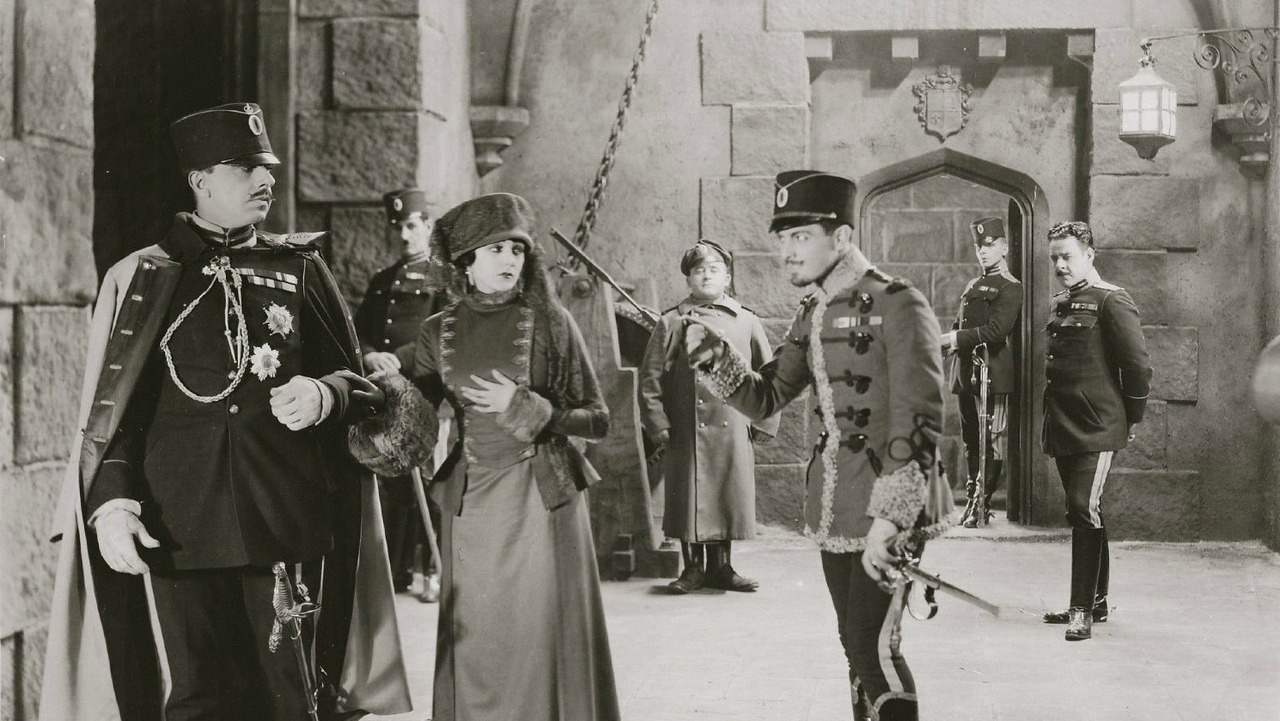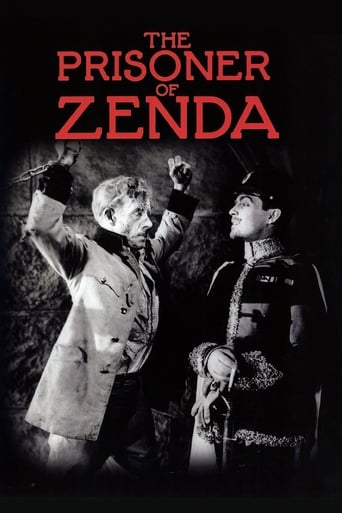

just watch it!
... View MoreDreadfully Boring
... View MoreA great movie, one of the best of this year. There was a bit of confusion at one point in the plot, but nothing serious.
... View MoreStory: It's very simple but honestly that is fine.
... View MoreCopyright 29 July 1922 by Metro Pictures Corporation. New York opening at the Astor: 31 July 1922. U.S. release: 11 September 1922. 10 reels. 10,467 feet. 116 minutes. COMMENT: Selected by The New York Times as one of the best films of the year, the familiar story (re-made with Ronald Colman in 1937 and Stewart Granger in 1952) is given grand treatment here.Some critics have complained of this version's lack of action. While it's true that Ingram does tend to concentrate more on the romance between Lewis Stone's reluctant Rassendyll and the beautiful princess (charmingly enacted by Alice Terry) and also on a closer examination of Black Michael's political intriguing than do the various remakes, there is nonetheless a fair amount of action-and it is well handled too, particularly the final sword duels between hero and villains with all the players including Stone, Holmes and Novarro doing their own fencing and doing it very ably indeed. In addition to these excitements, as might be expected, cinema stylist Rex Ingram has a grand time with all the sets, costumes and panoply of Zenda. It's amazing how close the remakes follow not only the plot and the various incidents, but even the incidentals like the opening knockabout at the railway station. Ramon Novarro's fans will be a little disappointed to find their hero playing the villain (especially as he is not quite as charming as in other versions), but everyone cheers when the beautiful Barbara La Marr enters. AVAILABLE on DVD through Grapevine. Quality rating varies from 5 to 7 out of ten, but almost all is quite watchable
... View MoreMonday August 14, 7:00:pm, The Paramount Theater"While you're unhung, Hentzau, hell lacks its master!" On the eve of his coronation, Rudolph Elphberg of Ruritania is poisoned by his jealous half-brother, Duke Michael of Strelsau. A distant English cousin, and the King's spitting-image, takes his place to save the throne. Anthony Hope's 1893 tale of romance and swordplay, The Prisoner of Zenda has seen no less than eight adaptations produced for the big screen, including three silent films, an animated Australian version and a television mini-series. The best known of the bunch today is the 1937 David O. Selznick production starring Ronald Coleman, Madeleine Carroll, David Niven and Mary Astor. Without a doubt, the 1922 Metro Pictures production, directed by Rex Ingram, is superior in its cinematic style, acting and production values. Ingram's film stars the exceptionally beautiful Alice Terry as Princess Flavia, and a wonderful newcomer, Ramon Novarro as Rupert of Hentzau. Lewis Stone stars as the irresponsible, drunken and character deficient King Rudolf, and his dignified, stalwart cousin Rudolf Rassendyll. Stone is best remembered as the wise old father of a well-known freckle-faced teenager with the voice of a strangled duck, whose character (Andy Hardy) grew up on screen in the thirties and forties. Ingram achieved significant success for himself and Metro the year before with The Four Horseman of the Apocalypse (1921), starring Terry and Rudolph Valentino. While filming their next production, The Conquering Power (1921), Valentino became willful and refused direction, at one point storming off the set. No doubt, his new found fame had gone to his head. His charming young replacement was Ramon Samaniegos, who changed his name to Novarro after Zenda's release. As Hentzau, Norarro is quick, clever and a thoroughly likable anti-hero. One of four officers loyal to "Black" Michael (Stuart Holmes), Hentzau is a mischievous young fellow, more playboy and prankster than serious villain, who spends much of his time chasing after Michael's mistress Antoinette (Barbara LaMarr). Ingram introduces Hentzau, as he stands up from the piano, flips his monocle in the air, and into his eye. Novarro virtually steals several scenes, even breaking character once as mugs directly at the camera! Ingram was able to draw great performances from his actors. As Rassendyl arrives at the coronation, he passes a dumbstruck Michael and pauses long enough to deliver a subtle expression of smug satisfaction with a raised eyebrow. Terry's performance as the future queen is graceful and dignified, a perfect match to Rassendyll, and their final scene is both lovely and heartbreaking. The cast is rounded out nicely with two well-known character actors. Snitz Edwards plays the King's butler and John George who worked with Lon Chaney, John Barrymore and nearly everyone else in Hollywood plays a decidedly darker than average role.Adding substantial integrity to the production, Ingram used Belgian Fencing Champion and USC coach Henry Uyttenhove as a trainer and consultant for the spectacular sword fight at the end of the picture. Uyttenhove also worked on several Douglas Fairbanks films, including Robin Hood (1922), and again with Ingram on Scaramouche (1923). "God does not always make the right men kings. You are the finest Elphberg of them all!"
... View MoreExpensive silent film of a king who is marked for assassination. He switches identities with a look alike (both played by Lewis Stone) who takes his place at his coronation. But the real king is kidnapped. While his followers try to find him, the fake king falls in love with Princess Flava (Alice Terry).Slow moving but the film looks great. No action...just lots of exagerrated looks and people endlessly talking. The sets, costumes and acting helps. Seeing Stone (who went on to play Judge Hardy in the Andy Hardy movies) so young and being a romantic lead is interesting. He's also very good. Terry is regal and also very good as the princess. Ramon Novarro (still an unknown) plays the evil villain. That's quite a shock--he always played heroes in his later films. He pulls it off though.So, it's beautiful but I can't totally recommend it.
... View MoreI've seen both Rex Ingram's "Scaramouche" and "The Prisoner of Zenda" and by far "Scaramouche" the more entertaining film. This film though, was very fascinating. Lewis Stone acquits himself well as the hero/drukand king and swordfights quite well. Alice Terry made a very beautiful princess. Ramon Novarro played the monocled villain, somewhat unintentionally funny. Barbara La Marr, the closeups of her face, wow! Seeing Valentino's "cousins" from "The Four Horseman of the Acapolyse" in supporting roles was really cool.However, the Colman/Fairbanks Jr. version is far superior.
... View More